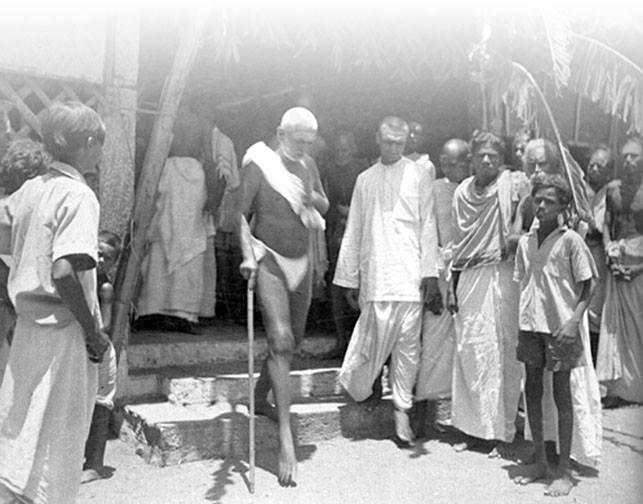697 - Swami Tejomayananda.
Chinmaya Mission :
Tuesday, February 2023. 06:00
Why Are Some Born Lucky?
========================================================================
The fear in man about the hereafter has risen from his failure to appreciate the logical continuity and the prefect sequence that is ever found in life. To consider that death is the end of an existence which started with the accident of birth, is a philosophy too rudimentary to be considered complete and exhaustive. In fact, it is only with a stretch of imagination that we can consider such a theory as a philosophy.
Daring intellects, bravely pushing ahead in the quest to understand and comprehend the laws of life and the meaning and purpose of the universe, cannot but accept that the existence of an individual in its present embodiment is but a single pearl in the necklace of Infinite Beauty, adorning the bosom of Truth. The present is the product of the past, and thought by thought, action by action, knowledge by knowledge we are creating for ourselves in the present the blue-print of our future. Therefore, the Hindus believe in the previous lives as well as in future births for all embodied souls; this is otherwise called the theory of re-incarnation.
The hereafter is ordered by the actions, performed and the motives entertained here. Actions in life can be mainly classified as good and evil; and the pursuers of evil can only slip down the path of evolution. Those who are doing good work alone can start their climb on to the higher points on the tower of their spiritual progress. Even here, there is a distinction between (a) actions performed with desires and (b) those that are performed in a spirit of dedicated love and in a sense of divine worship. Those who are employing themselves in the worship of the Lord with desire for heavenly enjoyments will, after their death, reach those planes-of-consciousness which are conducive for exhausting all such desires, and having exhausted these desires therein, they will take their birth again, here in the world, “in the houses of the pure and prosperous.” In short, all burning desires of every human being will be fulfilled at one time or another or the desires are strong enough and are accompanied by intense activities appropriate for their fulfillment. Those who are pursuing selfless worship of the Lord without the desire for heavenly enjoyments gain more and more easy integration, and as a result of it, they become dynamic minds capable of the highest medi¬tation. The more integrated a personality, the more spiritual he becomes, and therefore, he must be given a chance to fulfill himself, not in heaven, which is a place for enjoyment, but he must arrive right here to strive more diligently and achieve the highest. Such an ego-centre (jeeva) as soon as it leaves one embodiment immediately comes to manifest itself in a conducive atmosphere, where it can continue its pilgrimage without any obstruction. It being an aspiring heart, it should necessarily come to be “born only in a family of wise-men-of-meditation.”
This theory gives a lot of insight into the present day fallacy which gives such an exaggerated importance to one’s unhealthy environments and makes everyone polish against one’s surroundings. No doubt, in some ways than is a creature of his environments; but the same statement, when viewed through the glasses of philosophy gives also insight into the fact that the individuals in their own freedom, had themselves order¬ed in the past their own present environments. By merely changing his environments, the individual concerned cannot progress; a habitual drunkard may still conti¬nue drinking on the sly, even, if he were to be brought into a dry city to live among teetotalers.
Examples like Sankara, Ramanuja, Madhava Acharyas and other great masters can be considered as supporting this philosophical theory. Such men of brilliant genius, who, from their very early youth, exhibit super-human knowledge and godly wisdom, are no doubt, rare. Such a born-yogi completes his education much more easily than others, since, to him, it is not an education that is needed, but only a revision, or a recapitulation. In a very short time, he discovers that knowledge is bubbling up from within himself and to him study is but a rediscovery of a digested knowledge which was already lying, dormant in him.
A man who had in the past lived the life of self-control, study, and practice gathers unto himself those cultural traits and he, in this life, in spite of himself and in spite of all his adverse circumstances, environments and conditions of life, cannot but instinctively come to exhibit— in his attitudes to life, and in his behavior towards the things and beings in the world—a tranquility and a balance, which are a surprise even to himself.
This is no mere theory. The truth of statement is amply evident everywhere in any society, in all strata of its life, in all its professions and in all departments of its activities. Each one of us has an instructive bent of mind, and we are all irresistibly drawn towards it in spite of ourselves. This pull is most powerful when arising from our essential evolutionary tendencies. Even a candid chieftain can, overnight, turn himself to be a determined seeker and, ere long, become a great poet of the land, as Valmiki did in the past. Hundreds of such examples could be noted from our recent history and even amidst us today. In all those cases, the only satisfactory explanation will be that the individual mind-and-intellect was expressing through its given physical structure its own characteristic tendencies which it had acquired by itself in its past incarnations, through its own willful actions and deliberate motions.













Comments
Post a Comment